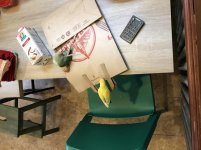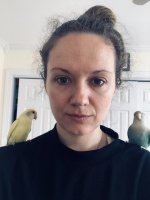Hello!
New here! This post is a bit long, but what else do we have to do these days, haha. I'll summarize up top and give more details below. I've been reading threads to search for answers to questions I've had. And here I have a question... and would appreciate any advice!
We have two lovebirds who both show hormones/mating signs, the female won't stop laying eggs, but they don't like each other!! We don't know if we should try something different or give up. Please help.
My partner Siyar and I got a female peachfaced olive lovebird in August 2018. Her name is Zeytin (it means "Olive" in Turkish). We are first-time parrot owners.
in August 2018. Her name is Zeytin (it means "Olive" in Turkish). We are first-time parrot owners.
She started laying eggs about a year ago. She had one of those coconut-shell beds, and she laid her egg in there. After doing some research, we realized we shouldn't put any kind of bed like that in her cage in order to deter her from laying eggs, and we learned to remove her eggs, and also about proper nutrition for her. We learned about all of the dangers off laying eggs, and we tried our best to keep her safe.
After she did not stop the egg-laying behavior (she did it off and on, laying up to 4-5 eggs each time), we did some more research, and thought about getting her a mate. We weighed the pros and cons, but ultimately we wanted her to be happy and safe, and we thought that would be the best way. We tried to do the right thing because we really do love her.
So, around September of this year, Siyar went to get another lovebird. It was really hard to find a lovebird that wasn't a baby, but we ended up getting a lovebird that was probably a couple of months old. (We got him from a breeder, so it's harder to know exactly his age and species). He is yellow and blue His name is Falco.
His name is Falco.
We kept them in separate cages, but next to each other. Her cage had an egg box and his did not. When we tried to introduce them, they did not hit it off. We thought maybe he was still too young and we needed to wait and it would happen eventually. They are still in separate cages, but next to each other. They are let out of their cages at the same time and they fly around without problems until they get close to each other. That is when she becomes aggressive towards him and attacks him until he flys away.
We have gone back and forth trying to decide if we should mate them or not, because Zeytin has not stopped laying eggs. Every couple of weeks, she gets into "her season" again. We took away the egg box, we took away her coconut. She laid them on the bottom of her cage! Oh, and whenever she is in this "season" she displays her wingspan and makes some kind of clucking sound. She also is constantly shredding paper. I've had to hide all the books in the house, all the mail, all the paper. She will find anything she can! She shreds matchboxes or even boxes from Amazon! And it's super cute because Falco tries to imitate her, but he's not as good as shredding. He follows her around and copies her behavior, but she does not like him.
Falco has recently displayed signs of wanting to mate (or so I've read on these forums)! He regurgitates onto his favorite toy that he also humps/grinds... He clicks a lot, and paces back and forth on Siyar's shoulders as if he is trying to show off. He is definitely older now, so I wouldn't be surprised...
We now think that they will never mate... either because we did something wrong in introducing them, maybe they are different species (how do you even tell?), or maybe they just don't like each other.
We don't know if we should try something else, or maybe get two more birds (one for each of them) or just try to stop the egg-laying behavior (and we've read the forum on that, too).
Any advice?! Thank you so much!
New here! This post is a bit long, but what else do we have to do these days, haha. I'll summarize up top and give more details below. I've been reading threads to search for answers to questions I've had. And here I have a question... and would appreciate any advice!
We have two lovebirds who both show hormones/mating signs, the female won't stop laying eggs, but they don't like each other!! We don't know if we should try something different or give up. Please help.
My partner Siyar and I got a female peachfaced olive lovebird
 in August 2018. Her name is Zeytin (it means "Olive" in Turkish). We are first-time parrot owners.
in August 2018. Her name is Zeytin (it means "Olive" in Turkish). We are first-time parrot owners.She started laying eggs about a year ago. She had one of those coconut-shell beds, and she laid her egg in there. After doing some research, we realized we shouldn't put any kind of bed like that in her cage in order to deter her from laying eggs, and we learned to remove her eggs, and also about proper nutrition for her. We learned about all of the dangers off laying eggs, and we tried our best to keep her safe.
After she did not stop the egg-laying behavior (she did it off and on, laying up to 4-5 eggs each time), we did some more research, and thought about getting her a mate. We weighed the pros and cons, but ultimately we wanted her to be happy and safe, and we thought that would be the best way. We tried to do the right thing because we really do love her.
So, around September of this year, Siyar went to get another lovebird. It was really hard to find a lovebird that wasn't a baby, but we ended up getting a lovebird that was probably a couple of months old. (We got him from a breeder, so it's harder to know exactly his age and species). He is yellow and blue
 His name is Falco.
His name is Falco. We kept them in separate cages, but next to each other. Her cage had an egg box and his did not. When we tried to introduce them, they did not hit it off. We thought maybe he was still too young and we needed to wait and it would happen eventually. They are still in separate cages, but next to each other. They are let out of their cages at the same time and they fly around without problems until they get close to each other. That is when she becomes aggressive towards him and attacks him until he flys away.
We have gone back and forth trying to decide if we should mate them or not, because Zeytin has not stopped laying eggs. Every couple of weeks, she gets into "her season" again. We took away the egg box, we took away her coconut. She laid them on the bottom of her cage! Oh, and whenever she is in this "season" she displays her wingspan and makes some kind of clucking sound. She also is constantly shredding paper. I've had to hide all the books in the house, all the mail, all the paper. She will find anything she can! She shreds matchboxes or even boxes from Amazon! And it's super cute because Falco tries to imitate her, but he's not as good as shredding. He follows her around and copies her behavior, but she does not like him.
Falco has recently displayed signs of wanting to mate (or so I've read on these forums)! He regurgitates onto his favorite toy that he also humps/grinds... He clicks a lot, and paces back and forth on Siyar's shoulders as if he is trying to show off. He is definitely older now, so I wouldn't be surprised...
We now think that they will never mate... either because we did something wrong in introducing them, maybe they are different species (how do you even tell?), or maybe they just don't like each other.
We don't know if we should try something else, or maybe get two more birds (one for each of them) or just try to stop the egg-laying behavior (and we've read the forum on that, too).
Any advice?! Thank you so much!

